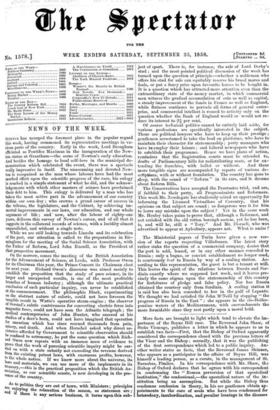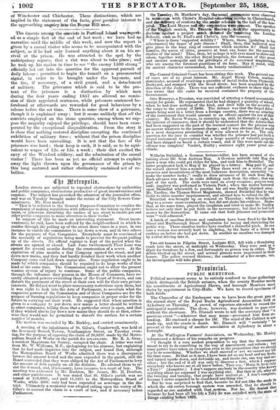NEAVS OF THE WEEK.
ScraNcE has usurped the foremost place in the popular regard this week, having summoned its representative meetings in va- rious parts of the country.- Early in the week, Lord Brougham officiated as Pontifex Maximus in the inauguration of the New- . ten statue at Grantham—the scene of Newton's early education. And besides the homage to local self-love in the municipal de- nionstration which celebrated the event, there was a spectacle really impressive in itself. The unassuming and devoted New- ton is recognized as the man whose labours have had the most marked effect upon the scientific progress of the race, his eulogy, is couched in a simple statement of what he did, and the acknow- ledgements with which other masters of science have proclaimed their debt to him. This eulogy is delivered by a man who has taken the most active part in the advancement of our country within our own day ; who crowns a grand career of success in the tribune, the legislature, and the Cabinet, by achieving im- mortal improvements in our laws our education, and our whole argument of life ; and- now, after the labour of eighty-one years, delivers this survey of Newton's career, and of all that it suggests in the collateral records of science, with a lucidity almost unparalleled, and without a single note.
While we are still looking towards Lincoln and its celebration of the past, our attention is called to the preparations in Bir- mingham for the meeting of the Social Science Association, with the Father of Reform, Lord John Russell, as the President of that prospective movement.
On the morrow, comes the meeting of the British Association for the Advancesnent of Science, at Leeds, with Professor Owen for its Chairman this year,- the Prince Consort its Chairman elect for next year. Richard Owen's discourse was aimed mainly to establish the proposition that the study of pure science, in its larger and unexpected results, is fine of the most profitable branches of human industry ; although the ultimate practical conclusion of each particular inquiry, can never be established at the commencement. The philosophic Black, experimenting on the abstract nature of caloric, could not have foreseen the tangible result in Watts's operative steam-engine ; the observer of Oersted's subtle contrivances for converting electric force into magnetic force, could not have seen the Atlantic telegraph ; the Medical contemporaries of John Hunter, who sneered at his studies of a deer's horn, could not have imagined that operation for aneurism which has since rescued thousands from pain, misery, and death. And when Herschel asked why direct as- sistance afforded by Government to scientific observation should be confined to astronomy, he put the same question which Rich- ard Owen now repeats with an immense mass of evidence to_ Rove that the work of pursuing scientific inquiry might be car- ried on with a state subsidy not exceeding the revenue derived hmn the existing patent laws, with enormous profits, however, to the whole nation. If we know more about the universe, its laWs and materials, we can use more of the implements in its tleascry,—thia is the practical proposition which the British As- sociation, as our scientific senate, is now developing in the pre- %nee of the country.
_As to politics they are out of town, with Ministers ; principles pe ellioYing the relaxation of the season, as statesmen are ; aad if there is any serious business, it turns upon this sub-
ject of sport. There is, for instance, the sale of Lord Derby's stud ; and the most pointed political discussion of the week has turned upon the question of principle—whether a nobleman who offers his stud for sale can equitably reserve his brood mares and foals, or put a fancy price upon favourite horses to be bought in. It is a question which has attracted more attention even than the extraordinary state of the money market, in which commercial men witness the gradual accumulation of coin as well as capital, a steady improvement of the funds in France as well as England, while flatness continues to pervade all forms of general enter- prise, and commercial intellect is roused to activity only on the question whether the Bank of England would or would not re- duce its interest to 21 per cent.
Of 'course technical politics cannot be entirely laid aside, for various professions are specifically interested in the subject. There are political lawyers who have to keep up their prestige.; gentlemen accustomed' tO take the lead on platforms, who have to. maintain their character for statesmanship ; party managers who have *employ their leisure ; and Liberal newspapers who have tb establish their programme. Hence we have plans of -action, reminders that the Registration. courts must be attended to, drafts of Parliamentary _bills for, redistributing seats, or for ex- tending the franchise, with ballot or without. And these more tangible signs are accompanied by reports of various de- scaipaions with or without foundation. The country has gone to sleep, with the sound of " Reform " in its ears, and it dreams about Reform Bills.
The Conservatives have accepted the Procrustes trial, and are, if faithful to their party, all Progressionists and Reformers. This week Mr. Newdegate has studiously seized an opportunity for informing the Licensed Victuallers of Coventry, that his opinions on that subject are sound ; so dangerous was it for him to leave any mistake upon the subject ? Yet in the same week Mr. Henley takes pains to prove that, although a Reformer, and • not satisfied with the old rotten borough sostem, yet he has been, is, and will be, still a "Tory." And Mr. Disraeli, who was advertised to appear at Aylesbury, appears not. What is amiss ?
The Ministerial papers of Turin have given a new ver- sion of the reports respecting Villafranca. The latest story rather sinks the question of a commercial company, denies that the port is sold, leased, or in any other manner conceded to Itassia.; only a bagno, or convict establishment no longer used, is courteously lent to Russia by way of a coaling station. Ac- cording to this representation, the guest is but a tenant at will. This leaves the spirit of the relations between Russia and Sar- dinia exactly where -we supposed last week, and it leaves pre- cisely the same stigma upon the statesmanship of this country for forfeitures of pledge and false policy. Nor has Russia obtained the courtesy only from Sardinia. A coaling station it is said has also been conceded to her in the gulf of Lepanto. We thought we had satisfied Sir John M`Neill by stopping "the progress of Russia in the East " ; she appears in the cis-Helles- pontine waters of the Mediterranean, with encroachments the more formidable since they rest partly upon a moral hold.
More facts are brought to light which tend to elevate the im- portance of the Boyne Hill ease. The Reverend John Shaw, of Stoke Vicarage, publishes a letter in which he appears to us to establish two facts—First, that the Bishop of Oxford apparently considered the correspondence closed with the previous letters of the Vicar and the Bishop ; secondly, that it was the publishing of the first correspondence which led to a public inquiry. An- other writer states as facts, that the Reverend James Skinner, who appears as a participator in the affairs of Boyne Hill, was himself a leading person, as a curate, •in the management of St. Barnabas, Pimlico. In his correspondence with Mr. Shaw, th3 Bishop of Oxford declares that he agrees with his correspondent in condemning the "Roman perversion of that apostolical institution," the confessional,—the apostolical nature of the in- stitution being an assumption. But while the Bishop thus condemns confession in theory, in his see gentlemen obtain ap- pointments to the oure of souls who have been condemned for heterodoxy, insubordination, and peculiar leanings in the dioceses
of Winchester and Chichester. These distinctions, which are implied in the statement of the facts, give peculiar interest to the approaching enquiry into the Boyne Hill ease.
The emeute among the =slots in Portland Islea& waszteport- ed as a simple fact at the end of last week ; we have had. so narrative until the middle of this week, and now the report is given by a casual visitor who seems to be unacquainted with the subject, as if he had only learned anything about it on his ar- rival at the prison. He was attracted to the spot by the anticipatory reports, that a riot was about to take place ; and he took up his station in time to see "the enemy 1500 strong" officially led out into the quarries for the apparent pursuit of daily labour ; permitted to begin the tumult on a preconcerted signal, in order to be brought under the bayonets, and the fire, if necessary, of a civil guard, and a detachment of military. The grievance which is said to be the pre- text of the prisoners is a distinction by which men during the four years ending 1857 are allowed no remis- sion of their appointed sentences, while prisoners sentenced be- forehand or afterwards are rewarded for good behaviour by a release before the set time. There is some show of a grievance, though it is explained away ; but it seems unlikely that all the convicts employed on the stone quarries, among whom we sup- pose the majority enjoyed the privilege, should have been exas- perated by the exceptional disqualification. From the story it is clear that nothing restored discipline excepting the continued exhibition of military force ; without that the prison discipline would have been unavailing. It is not that the fare of the prisoners was hard ; their keep is such, it is said, as to be equi- valent to wages of 128. or 158. a week ; their diet excited the envy of the Wexford soldiery, and the admiration of the casual visitor ! There has been as yet no official attempt to explain away the light thrown upon the governance of the prison by this long matured and rather obstinately sustained act of re- bellion.



























 Previous page
Previous page